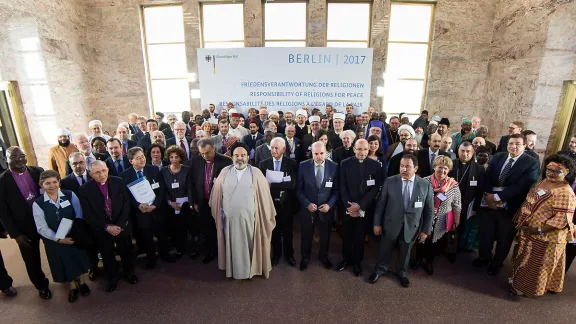
Photo: Florian Gärtner/photothek.net
LWF President Musa at “Responsibility of Religions for Peace” conference in Berlin
The Lutheran World Federation (LWF) has said it welcomes an initiative by the German Federal Foreign Office seeking to engage with religious leaders in peace building efforts at national and international levels.
“We as Lutherans welcome this new initiative of the German Federal Foreign Office and are ready to engage in peace building together with representatives from other religious communities,” LWF President Archbishop Dr Panti Filibus Musa said. He participated with other LWF representatives in the high-level conference on “Responsibility of Religions for Peace,” organized by the Ministry for Foreign Affairs in Berlin, 21-23 May.
The LWF president commended the willingness of government representatives to “listen to the experiences and insights of the religious leaders, especially in identifying how religious communities can positively contribute to peace building.”
We as Lutherans welcome this new initiative of the German Federal Foreign Office and are ready to engage in peace building together with representatives from other religious communities.
Musa attended the conference alongside LWF member church leaders Bishop Dr Tamás Fabiny (Evangelical Lutheran Church in Hungary), Bishop Dr Munib A. Younan and Rev. Dr Mitri Raheb (Evangelical Lutheran Church in Jordan and the Holy Land), and Rev. Mamadou T. Diouf (Lutheran Church of Senegal). The delegation also included World Service country program representatives Adamou Koumanda (Chad) and Kasongo Mutshaila (Mauritania), and Rev. Dr Simone Sinn, LWF study secretary for Public Theology and Interreligious Relations.
They participated in working groups discussing mediation and conflict management by religious representatives; interfaith cooperation and peace projects; religion in the media and the public domain; cooperation between religious communities and governments to promote the cause of peace; and peace education at schools and universities.
Sinn said the combination of both LWF church leaders and country program representatives offered important insights into the ongoing work and deep involvement with communities on the ground in activities aimed at overcoming conflict. “These local experiences need to inform policy making for the political and diplomatic professionals,” she noted.
In his opening address to the 100 leaders of many different faith communities from 53 countries around the world, the Federal Foreign Minister Sigmar Gabriel said it was important for international policy makers to address together with religious leaders their special responsibility in harnessing the strength, knowledge, resilience and long-term vision of religions for practical work to promote peace.
He expressed the German government’s willingness to work out how the power of religion can be unlocked to address issues that threaten to drift societies apart, or even worse, deal with social conflicts that flare into violence and civil war. “For it is my impression that in such situations societies need a great deal of strength, a great deal of courage and a great deal of optimism in order to escape this spiral of escalating violence,” he said. Religious leaders, he added, “have a responsibility simply because their words and actions carry great weight in their communities.”
For Sinn, “participating in the conference affirmed not only LWF’s advocacy on diaconal and humanitarian issues, but also the need to be vocal on the questions of conflict and peace.”


